Module 8 Time off Unit 2 We thought somebody was moving about课件(共47张PPT)
文档属性
| 名称 | Module 8 Time off Unit 2 We thought somebody was moving about课件(共47张PPT) | 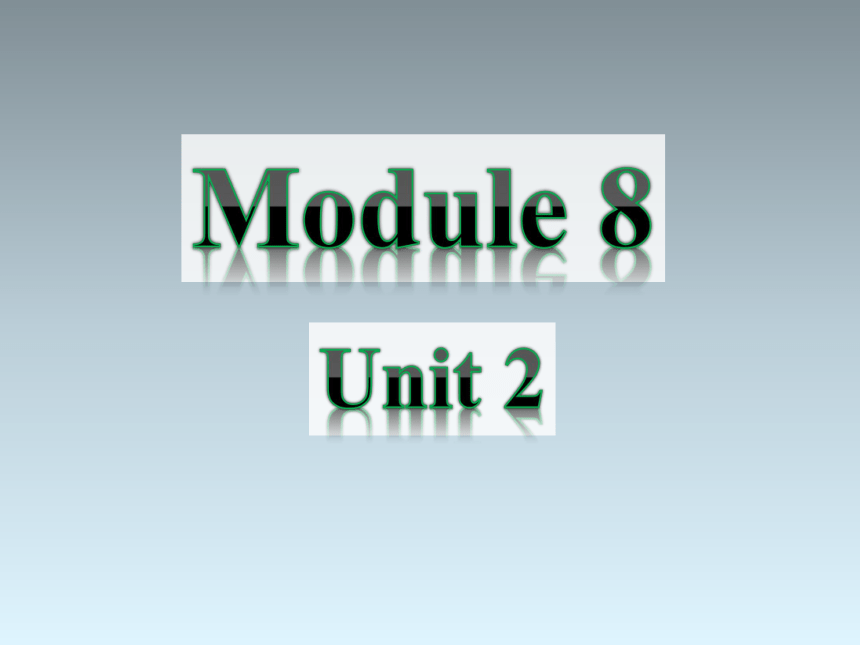 | |
| 格式 | ppt | ||
| 文件大小 | 3.5MB | ||
| 资源类型 | 教案 | ||
| 版本资源 | 外研版 | ||
| 科目 | 英语 | ||
| 更新时间 | 2022-07-20 16:21:12 | ||
图片预览


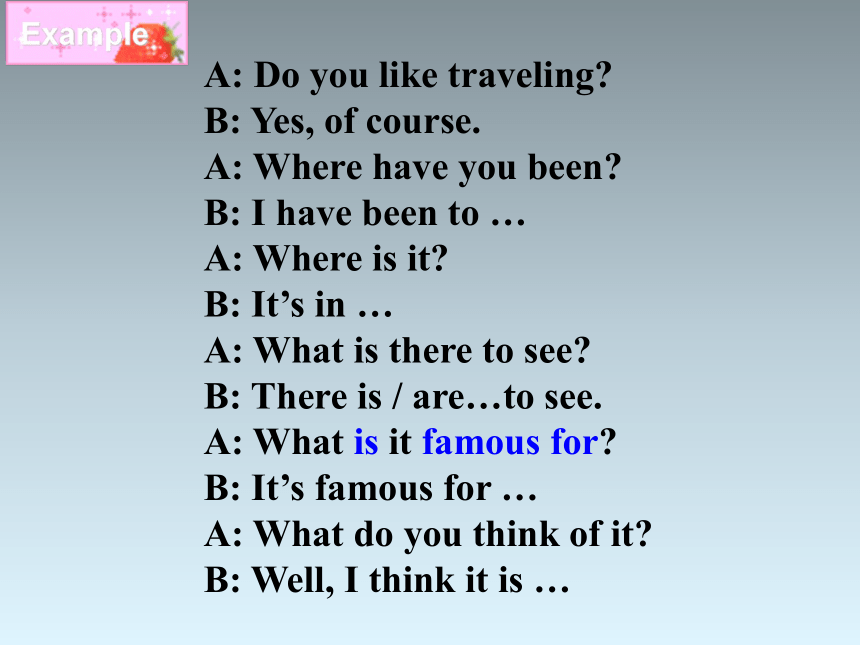


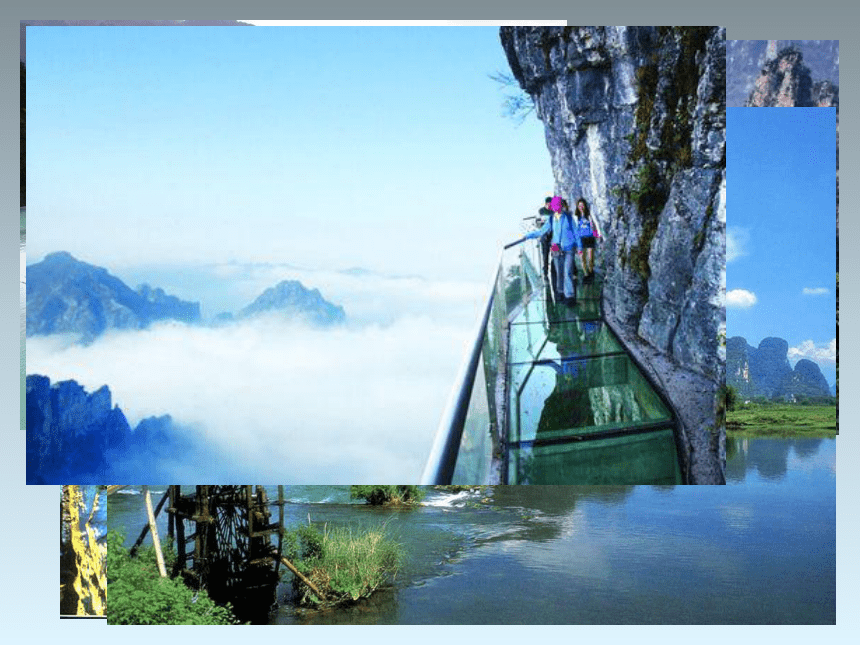
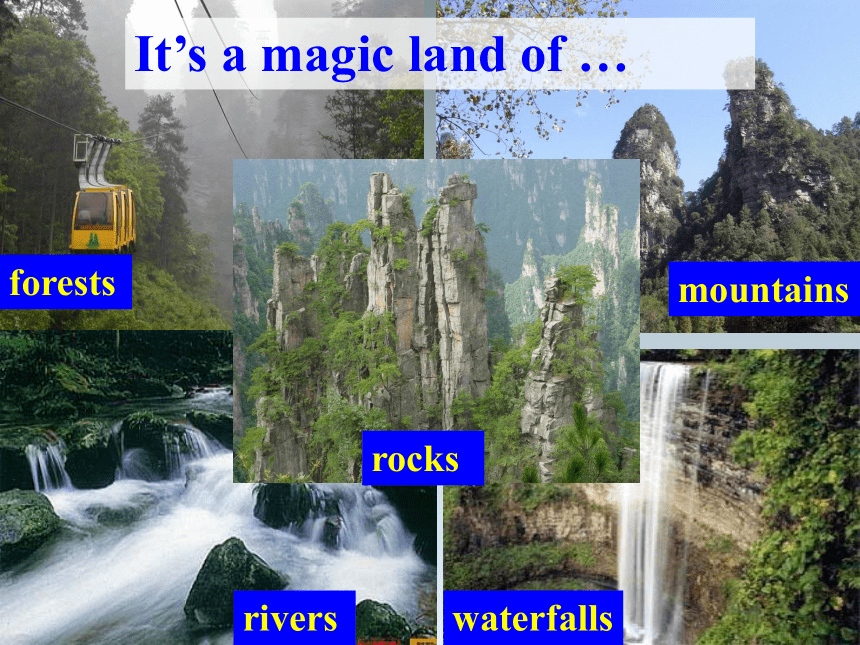
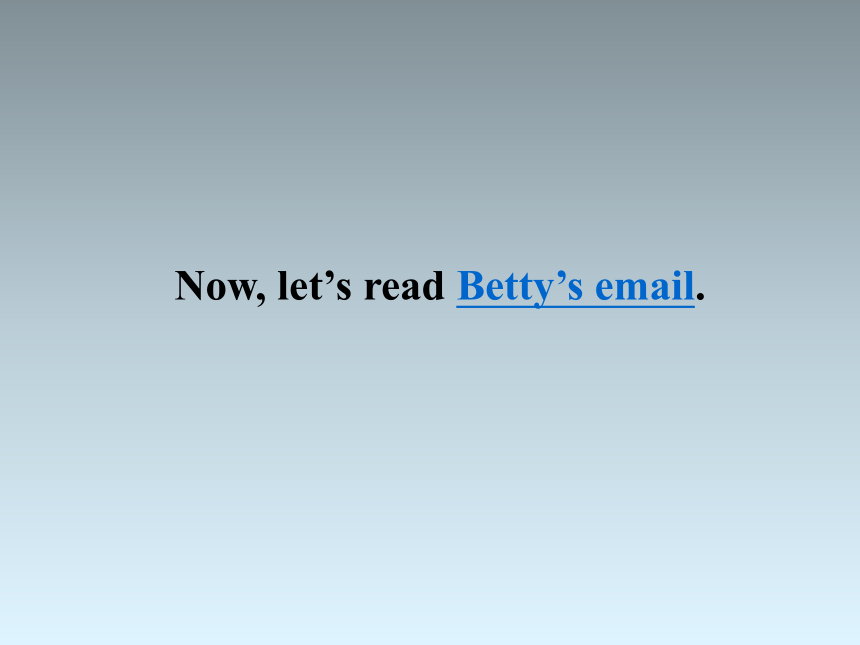
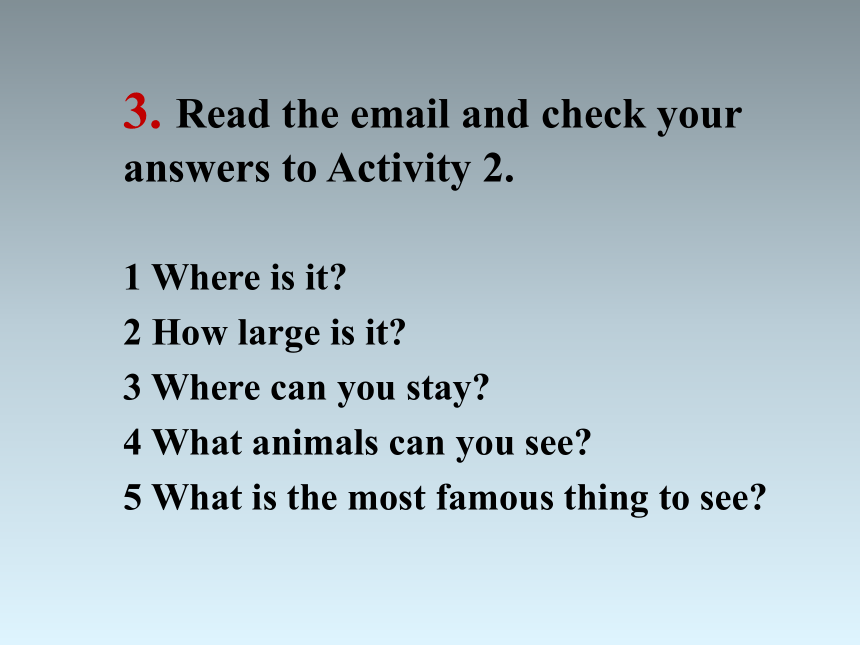


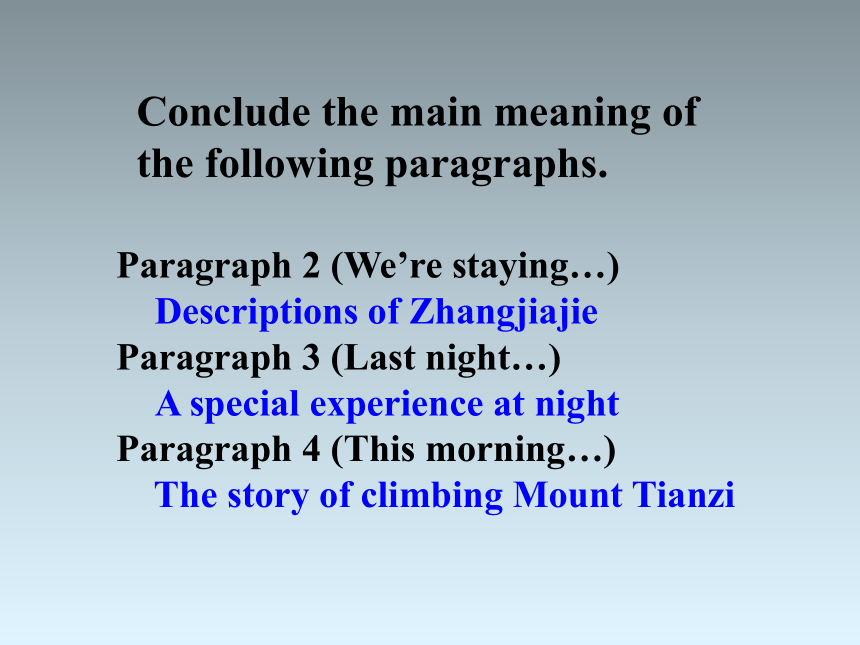
文档简介
(共47张PPT)
Where have you been when you had time off
Talk with your partner.
A: Do you like traveling
B: Yes, of course.
A: Where have you been
B: I have been to … A: Where is it
B: It’s in …
A: What is there to see
B: There is / are…to see.
A: What is it famous for
B: It’s famous for …
A: What do you think of it
B: Well, I think it is …
2. Work in pairs. What do you know about Zhangjiajie Can you answer the questions
1 Where is it
2 How large is it
3 Where can you stay
4 What animals can you see
5 What is the most famous thing to see
Zhangjiajie
What can you see
What do you think of it
forests
mountains
rivers
waterfalls
It’s a magic land of …
rocks
Now, let’s read Betty’s email.
3. Read the email and check your answers to Activity 2.
1 Where is it
2 How large is it
3 Where can you stay
4 What animals can you see
5 What is the most famous thing to see
Paragraph 1 ____ Paragraph 2 _____
Paragraph 3 ____
B. The story of their climbing Mount Tianzi
A. Descriptions of Zhangjiajie.
C . A special experience at night during the holiday.
A
C
B
Listen to the letter quickly and find the main idea for Paragraph 1, 2 and 3.
4. Number the sentences in the correct order.
Betty pulled a leaf off a plant.
The noise woke everybody up.
They climbed Mount Tianzi.
A monkey made some noise.
They camped by a small lake.
Lingling’s uncle said that people should protect everything in Zhangjiajie.
5
3
4
2
1
6
Conclude the main meaning of the following paragraphs.
Paragraph 2 (We’re staying…)
Descriptions of Zhangjiajie
Paragraph 3 (Last night…)
A special experience at night
Paragraph 4 (This morning…)
The story of climbing Mount Tianzi
Paragraph 2
Answer the questions.
1. Who does Betty is staying with
Betty is staying with Lingling’s uncle.
2. How does Betty think of Zhangjiajie
It is a magic land of mountains, forests and rivers.
1.Last night, they camped on the mountain.
A loud noise worried her on that night.
They found a hungry monkey is looking for food.
F
T
T
Check the true sentences.
Paragraph 3
Paragraph 3 describes the special experience at night. Can you act it out with your partners
Betty: What noise is it Wake up, uncle! Wake up, Lingling!
Lingling: What’s wrong
Betty: Can you hear the noise What’s it
Lingling: As if someone is laughing.
Uncle: Don’t worry. Let me go out and have a look.
(After a minute, uncle comes back.)
Uncle: SSh, come out, but please be quiet!
Betty and Lingling: OK.
(They come out.)
Uncle: Look over there! What can you see
Betty and Lingling: Oh, it’s a monkey!
Uncle: It sees us! It is running away!
Fill in the blanks without books.
This morning we climbed Mount Tianzi. From the top, we____ ____ see the lakes and forests, but we could only ____the mountain tops above the clouds. Then we _____ _____the path, along a river, past trees, and other plants and back to our camp. I _____ a leaf ____ a plant, but Lingling’s uncle ____ that it was wrong to ____leaves off plants and that we should ______ everything here. I was very sorry.
hoped to
see
walked down
pulled off
said
pull
protect
Paragraph 4
The guide’s advice
Man should get on well with the nature! (人与自然和谐共处!)
Answer the questions.
1. Where are they going to tomorrow
2. When will they go back home
They’re going to Dongting Lake.
Next week.
Paragraph 5 & 6
Are there rocks in _______ or animal
________ in your home town
2. How many __________ is Zhangjiajie from your home town
3. Is it safer to walk along a ________ or climb over rocks
4. Where do you _______ you were right now
5. Complete the sentences with the correct form of the words in the box.
human kilometre path shape wish
human
shapes
kilometres
path
wish
Talk with your partner what you know about Zhangjiajie.
Then write them down.
7. Read the information about Zhangjiajie.
How large is it
Where it is
What can you see
What’s special
Where can you sleep
about 480 square kilometres
about 400 kilometres from Changsha
mountains, rivers, forests, many kinds of plants and animals
strange shape of tall tocks, beautiful sights
hotels or camps
Now decide which is more personal, Betty’s email or the information in this table.
Do you know any important or interesting facts about Zhangjiajie Talk about it in groups.
Now choose the most important or interesting facts about Zhangjiajie and write a paragraph about it.
Zhangjiajie is about 480 square kilometres, and …
Zhangjiajie is about 489 square kilometres. It is about 400 kilometres from Changsha. Everyone loves its unusual mountains, rivers and forests. There are a lot of different plants and animals there too. Zhangjiajie is popular with people because of the shape of its tall rocks, and its beautiful sights. Visitors can stay in hotels or tents in the park.
Introduce a beautiful place.
Hello! Everybody!
Welcome to_________ . I’m glad to show you around ________. It is in ______________.
As tourists, you should ______, but you shouldn’t ___________________________.
I hope you’ll have a good time here!
Write a paragraph about a place of interest. A
/ An ________ trip
(exciting / interesting / wonderful / unhappy / sad …)
What did you see there
What did you do there
What happened to you
How did you feel there
…
1. I’m having a wonderful time here ...
Sally said that she had a good time in Beijing last week. (enjoyed herself)
萨丽说她上周在北京玩得很高兴。
have a wonderful time 玩得高兴
= have a great time / enjoy oneself
be famous for = be known for 因……而著名
China is famous for the Great Wall.
中国以长城而闻名。
Beijing is famous for its history. Now it is famous for holding the 2008 Olympic Games.
北京以它的历史而闻名,现在它因举办2008年奥运会而闻名。
2. It’s famous for the strange shape of its tall rocks.
be famous for & be famous as
(1) 当主语是表示人的名词时,be famous for表示“以某种知识、技能、作品或特征而出名”,而be famous as则表示“以某种身份而出名”。
He is famous for his great inventions.
因为他的伟大发明,他出名了。
He is famous as a great inventor.
他是出了名的伟大的发明家。
辨析
(2)当主语是表示地点的名词时,be famous for表示“以某种特点(产品)而出名”,be famous as表示“以什么样的产地/地方而出名”。
France is famous for his fine food and wine.
法国的美食和酒是出了名的。
The town is famous as a wine-producing place.
这个镇是一个出名的产酒镇。
(3)当主语是事物名词时,be famous for表示“以其内容、特征、价值等而被人所知”,be famous as表示“以某种形式出名”。
This book is famous as a conference book.
这本书是出名的参考书。
根据句意用be famous as或be famous for的适当形式填空。
(1) Han Han ____________ his writings. (2) As we know, Yao Ming __________ a basketball player.
is famous for
is famous as
be famous to sb. 广为人知,大家都熟悉的
Chairman Mao is famous to every Chinese.
毛主席的名字广为人知(中国人都知道毛主席)。
拓展
3. Some of them look like …
look like 看起来像……
Doesn’t she look like her mother
她长得不是很像她母亲吗
What does your car look like
您的车看起来是什么样子?
4. Last night we camped by a small lake.
by… 在一边/旁边
I’m standing by the desk.
我站在课桌旁。
Please stop by over there.
请靠边,在那儿停下来。
wake up 叫醒,唤醒;醒来
She wakes up her daughter every morning.
她每天叫她的女儿起床。
Wake up the children and dress them.
叫醒孩子,给他们穿上衣服。
I woke up at six o’clock this morning.
今天早上我六点就醒来了。
5. It woke everybody up.
根据汉语提示完成英文句子。
1. 明天早上七点钟请把我叫醒。
Please ___________ at seven tomorrow morning.
2. 我昨晚十二点醒来喝了一杯水。
I __________ at 12:00 last night and drank a glass of water.
wake me up
woke up
6. From the top we hoped to see …
hope to do sth. 希望做某事
I hope to have a nice house.
我渴望拥有一套漂亮的房子。
I hope to get away early in the morning.
我希望一早就动身离开。
hope for + n. 希望…
We hope for an early answer.
我们希望早日得到答复。
Hope for the best and prepare for the worst.
【谚】抱最好的希望,作最坏的准备。
拓展
hope + that + clause 希望…
Our teacher hopes (that) we should study hard for the bright future.
老师希望我们为了美好的明天努力学习。
I hope that it will pass the test.
我希望那东西能够通过检验。
7. But it was a pity that it was cloudy.
“It is / was a pity that +从句” 表示“很遗憾 ……”
It was a pity that he failed the exam.
很遗憾,他没通过考试。
It was a pity that you didn’t come last night.
你昨天晚上没来,真可惜。
8. I pulled a leaf off a plant …
pull v. (用手)拉;牵;扯。反义词为push“推”。
Don’t push the door. Pull it, please.
不要推门。请拉门。
Do not pull the chairs about, boys!
不要把椅子拖来拖去,孩子们!
pull … off … 从 … 拉下…
pull about 把…拖来拖去;粗暴/笨拙地对待(某人或某物)
pull in (火车)进站;(船)靠岸
put down 毁坏,拆毁(某物,尤指建筑物);使虚弱,拖垮
拓展
9. Tomorrow we’re going to Dongting Lake, the second-largest freshwater lake in China.
the second-largest 第二大…
“定冠词 the + 序数词 + 最高级..…. ”表示“第几最… …的”
Yellow River is the second largest river in China.
黄河是中国第二长的河流。
She is the second tallest student in our class.
她是我们班第二高的学生。
Where have you been when you had time off
Talk with your partner.
A: Do you like traveling
B: Yes, of course.
A: Where have you been
B: I have been to … A: Where is it
B: It’s in …
A: What is there to see
B: There is / are…to see.
A: What is it famous for
B: It’s famous for …
A: What do you think of it
B: Well, I think it is …
2. Work in pairs. What do you know about Zhangjiajie Can you answer the questions
1 Where is it
2 How large is it
3 Where can you stay
4 What animals can you see
5 What is the most famous thing to see
Zhangjiajie
What can you see
What do you think of it
forests
mountains
rivers
waterfalls
It’s a magic land of …
rocks
Now, let’s read Betty’s email.
3. Read the email and check your answers to Activity 2.
1 Where is it
2 How large is it
3 Where can you stay
4 What animals can you see
5 What is the most famous thing to see
Paragraph 1 ____ Paragraph 2 _____
Paragraph 3 ____
B. The story of their climbing Mount Tianzi
A. Descriptions of Zhangjiajie.
C . A special experience at night during the holiday.
A
C
B
Listen to the letter quickly and find the main idea for Paragraph 1, 2 and 3.
4. Number the sentences in the correct order.
Betty pulled a leaf off a plant.
The noise woke everybody up.
They climbed Mount Tianzi.
A monkey made some noise.
They camped by a small lake.
Lingling’s uncle said that people should protect everything in Zhangjiajie.
5
3
4
2
1
6
Conclude the main meaning of the following paragraphs.
Paragraph 2 (We’re staying…)
Descriptions of Zhangjiajie
Paragraph 3 (Last night…)
A special experience at night
Paragraph 4 (This morning…)
The story of climbing Mount Tianzi
Paragraph 2
Answer the questions.
1. Who does Betty is staying with
Betty is staying with Lingling’s uncle.
2. How does Betty think of Zhangjiajie
It is a magic land of mountains, forests and rivers.
1.Last night, they camped on the mountain.
A loud noise worried her on that night.
They found a hungry monkey is looking for food.
F
T
T
Check the true sentences.
Paragraph 3
Paragraph 3 describes the special experience at night. Can you act it out with your partners
Betty: What noise is it Wake up, uncle! Wake up, Lingling!
Lingling: What’s wrong
Betty: Can you hear the noise What’s it
Lingling: As if someone is laughing.
Uncle: Don’t worry. Let me go out and have a look.
(After a minute, uncle comes back.)
Uncle: SSh, come out, but please be quiet!
Betty and Lingling: OK.
(They come out.)
Uncle: Look over there! What can you see
Betty and Lingling: Oh, it’s a monkey!
Uncle: It sees us! It is running away!
Fill in the blanks without books.
This morning we climbed Mount Tianzi. From the top, we____ ____ see the lakes and forests, but we could only ____the mountain tops above the clouds. Then we _____ _____the path, along a river, past trees, and other plants and back to our camp. I _____ a leaf ____ a plant, but Lingling’s uncle ____ that it was wrong to ____leaves off plants and that we should ______ everything here. I was very sorry.
hoped to
see
walked down
pulled off
said
pull
protect
Paragraph 4
The guide’s advice
Man should get on well with the nature! (人与自然和谐共处!)
Answer the questions.
1. Where are they going to tomorrow
2. When will they go back home
They’re going to Dongting Lake.
Next week.
Paragraph 5 & 6
Are there rocks in _______ or animal
________ in your home town
2. How many __________ is Zhangjiajie from your home town
3. Is it safer to walk along a ________ or climb over rocks
4. Where do you _______ you were right now
5. Complete the sentences with the correct form of the words in the box.
human kilometre path shape wish
human
shapes
kilometres
path
wish
Talk with your partner what you know about Zhangjiajie.
Then write them down.
7. Read the information about Zhangjiajie.
How large is it
Where it is
What can you see
What’s special
Where can you sleep
about 480 square kilometres
about 400 kilometres from Changsha
mountains, rivers, forests, many kinds of plants and animals
strange shape of tall tocks, beautiful sights
hotels or camps
Now decide which is more personal, Betty’s email or the information in this table.
Do you know any important or interesting facts about Zhangjiajie Talk about it in groups.
Now choose the most important or interesting facts about Zhangjiajie and write a paragraph about it.
Zhangjiajie is about 480 square kilometres, and …
Zhangjiajie is about 489 square kilometres. It is about 400 kilometres from Changsha. Everyone loves its unusual mountains, rivers and forests. There are a lot of different plants and animals there too. Zhangjiajie is popular with people because of the shape of its tall rocks, and its beautiful sights. Visitors can stay in hotels or tents in the park.
Introduce a beautiful place.
Hello! Everybody!
Welcome to_________ . I’m glad to show you around ________. It is in ______________.
As tourists, you should ______, but you shouldn’t ___________________________.
I hope you’ll have a good time here!
Write a paragraph about a place of interest. A
/ An ________ trip
(exciting / interesting / wonderful / unhappy / sad …)
What did you see there
What did you do there
What happened to you
How did you feel there
…
1. I’m having a wonderful time here ...
Sally said that she had a good time in Beijing last week. (enjoyed herself)
萨丽说她上周在北京玩得很高兴。
have a wonderful time 玩得高兴
= have a great time / enjoy oneself
be famous for = be known for 因……而著名
China is famous for the Great Wall.
中国以长城而闻名。
Beijing is famous for its history. Now it is famous for holding the 2008 Olympic Games.
北京以它的历史而闻名,现在它因举办2008年奥运会而闻名。
2. It’s famous for the strange shape of its tall rocks.
be famous for & be famous as
(1) 当主语是表示人的名词时,be famous for表示“以某种知识、技能、作品或特征而出名”,而be famous as则表示“以某种身份而出名”。
He is famous for his great inventions.
因为他的伟大发明,他出名了。
He is famous as a great inventor.
他是出了名的伟大的发明家。
辨析
(2)当主语是表示地点的名词时,be famous for表示“以某种特点(产品)而出名”,be famous as表示“以什么样的产地/地方而出名”。
France is famous for his fine food and wine.
法国的美食和酒是出了名的。
The town is famous as a wine-producing place.
这个镇是一个出名的产酒镇。
(3)当主语是事物名词时,be famous for表示“以其内容、特征、价值等而被人所知”,be famous as表示“以某种形式出名”。
This book is famous as a conference book.
这本书是出名的参考书。
根据句意用be famous as或be famous for的适当形式填空。
(1) Han Han ____________ his writings. (2) As we know, Yao Ming __________ a basketball player.
is famous for
is famous as
be famous to sb. 广为人知,大家都熟悉的
Chairman Mao is famous to every Chinese.
毛主席的名字广为人知(中国人都知道毛主席)。
拓展
3. Some of them look like …
look like 看起来像……
Doesn’t she look like her mother
她长得不是很像她母亲吗
What does your car look like
您的车看起来是什么样子?
4. Last night we camped by a small lake.
by… 在一边/旁边
I’m standing by the desk.
我站在课桌旁。
Please stop by over there.
请靠边,在那儿停下来。
wake up 叫醒,唤醒;醒来
She wakes up her daughter every morning.
她每天叫她的女儿起床。
Wake up the children and dress them.
叫醒孩子,给他们穿上衣服。
I woke up at six o’clock this morning.
今天早上我六点就醒来了。
5. It woke everybody up.
根据汉语提示完成英文句子。
1. 明天早上七点钟请把我叫醒。
Please ___________ at seven tomorrow morning.
2. 我昨晚十二点醒来喝了一杯水。
I __________ at 12:00 last night and drank a glass of water.
wake me up
woke up
6. From the top we hoped to see …
hope to do sth. 希望做某事
I hope to have a nice house.
我渴望拥有一套漂亮的房子。
I hope to get away early in the morning.
我希望一早就动身离开。
hope for + n. 希望…
We hope for an early answer.
我们希望早日得到答复。
Hope for the best and prepare for the worst.
【谚】抱最好的希望,作最坏的准备。
拓展
hope + that + clause 希望…
Our teacher hopes (that) we should study hard for the bright future.
老师希望我们为了美好的明天努力学习。
I hope that it will pass the test.
我希望那东西能够通过检验。
7. But it was a pity that it was cloudy.
“It is / was a pity that +从句” 表示“很遗憾 ……”
It was a pity that he failed the exam.
很遗憾,他没通过考试。
It was a pity that you didn’t come last night.
你昨天晚上没来,真可惜。
8. I pulled a leaf off a plant …
pull v. (用手)拉;牵;扯。反义词为push“推”。
Don’t push the door. Pull it, please.
不要推门。请拉门。
Do not pull the chairs about, boys!
不要把椅子拖来拖去,孩子们!
pull … off … 从 … 拉下…
pull about 把…拖来拖去;粗暴/笨拙地对待(某人或某物)
pull in (火车)进站;(船)靠岸
put down 毁坏,拆毁(某物,尤指建筑物);使虚弱,拖垮
拓展
9. Tomorrow we’re going to Dongting Lake, the second-largest freshwater lake in China.
the second-largest 第二大…
“定冠词 the + 序数词 + 最高级..…. ”表示“第几最… …的”
Yellow River is the second largest river in China.
黄河是中国第二长的河流。
She is the second tallest student in our class.
她是我们班第二高的学生。
同课章节目录
- Module 1 Feelings and impressions
- Unit 1 It smells delicious.
- Unit 2 I feel nervous when I speak Chinese .
- Unit 3 Language in use
- Module 2 Experiences
- Unit 1 I've also entered lots of speaking competi
- Unit 2 They have seen the Pyramids.
- Unit 3 Language in use
- Module 3 Journey to space
- Unit 1 Has it arrived yet?
- Unit 2 We have not found life on any other planet
- Unit 3 Language in use
- Module 4 Seeing the docto
- Unit 1 I haven't done much exercise since I got m
- Unit 2 We have played football for a year now
- Unit 3 Language in use
- Module 5 Cartoons
- Unit 1 It's time to watch a cartoon.
- Unit 2 Tintin has been popular for over eighty yea
- Unit 3 Language in use
- Revision module A
- Module 6 Hobbies
- Unit 1 Do you collect anything ?
- Unit 2 Hobbies can make you grow as a person.
- Unit 3 Language in use
- Module 7 Summer in Los Angeles
- Unit 1 Please write to me and send me some photos
- Unit 2 Fill out a form and come to learn English
- Unit 3 Language in use
- Module 8 Time off
- Unit 1 I can hardly believe we are in the city ce
- Unit 2 We thought somebody was moving about
- Unit 3 Language in use
- Module 9 Friendship
- Unit 1 Could I ask if you've mentioned this to he
- Unit 2 I believe that the world is what you think
- Unit 3 Language in use
- Module 10 On the radio
- Unit 1 I hope that you can join us one day
- Unit 2 It seemed that they were speaking to me in
- Unit 3 Language in use
- Revision module B
